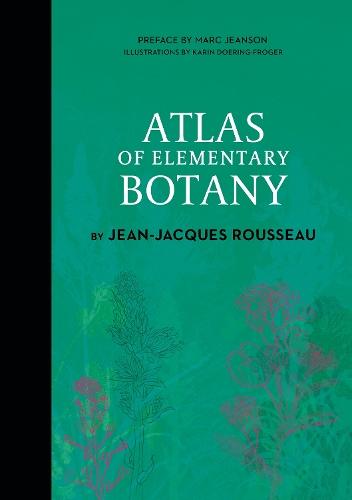
Atlas of Elementary Botany by Jean-Jacques Rousseau
(Hardback)
Publishing Details
Atlas of Elementary Botany by Jean-Jacques Rousseau
By (Author) Jean-Jacques Rousseau
Illustrated by Karin Doering-Froger
Foreword by Marc Jeanson
Schiffer Publishing Ltd
Schiffer Publishing Ltd
28th June 2025
United States
Classifications
General
Non Fiction
Ethics and moral philosophy
Nature and the natural world: general interest
580
Physical Properties
Hardback
128
Width 191mm, Height 267mm
513g
Description
Explore the natural world through Jean-Jacques Rousseau's letters on botany-a beautifully written reflection on plants, nature, and philosophy by one of the Enlightenment's greatest thinkers. Whether on his philosophical walks or his bucolic wanderings: Jean-Jacques Rousseau, a Swiss-born philosopher, writer, and composer whose works profoundly influenced the Enlightenment and the French Revolution, always portrayed a deep passion for plant collecting. Between 1771 and 1774, he composed eight letters offering lessons in botany, addressed to Madame Delessert and destined to teach her young daughter Madelon. These letters constitute the thinker's final work, alongside Reveries of a Solitary Walker, and reverberated throughout Europe in the early nineteenth century. Rousseau's project was much more than a simple lesson in pedagogy; it is, rather, a genuine invitation to observe plants. Under his pen, the descriptions are elevated to the rank of art, and contemplation achieves the status of science. Liliaceous, cruciform, papilionaceous, and umbellate plants combine to compose a poetic herbarium. AUTHORS: Jean-Jacques Rousseau (17121778) was a Swiss-born philosopher, writer, and composer whose works profoundly influenced the Enlightenment and the French Revolution. Known for The Social Contract and Emile, he championed individual freedom, direct democracy, and education reform, advocating that society should align with the natural goodness of humanity. Marc Jeanson is a botanist and the former director of the National Herbarium at the Musum National d'Histoire Naturelle in Paris and currently serves as botanical director of the Majorelle Garden in Marrakech, Morocco. He is the author of Botaniste (Grasset, 2019). SELLING POINTS: . Botanical Science Meets Art: Rousseau's botanical letters, written between 1771-1774, blend art and science and offer poetic lessons in botany. The result is an elevated understanding of plants. . Revives Classical Works for Modern Audiences: Rousseau's last great project-this series of eight botanical letters addressed to Madame Delessert and her daughter brings his botanical lessons to a new audience. . Outdoor Learning: Since the pandemic audiences have been clamoring to live and learn out of doors. This is the ideal volume for plant lovers seeking inspiration from nature's smallest wonders!
Author Bio
Jean-Jacques Rousseau (17121778) was a Swiss-born philosopher, writer, and composer whose works profoundly influenced the Enlightenment and the French Revolution. Known for The Social Contract and Emile, he championed individual freedom, direct democracy, and education reform, advocating that society should align with the natural goodness of humanity. Marc Jeansonis a botanist and the former director of the National Herbarium at the Musum National dHistoire Naturelle in Paris and currently serves as botanical director of the Majorelle Garden in Marrakech, Morocco. He is the author ofBotaniste(Grasset, 2019).
